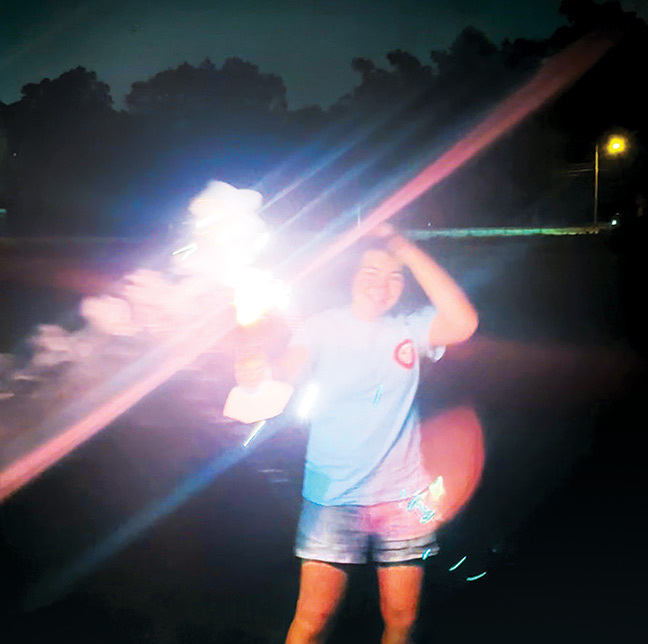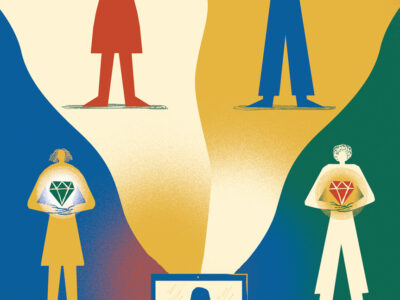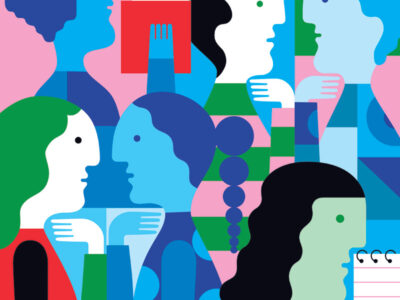
Coming of age with Generation Z.
By Daphne Glatter
Upon coming home from my first semester of college, I had a number of conversations that went like this:
—How have you been?
—OK. How’s school?
—Great! Being in a new place has been good for me.
—I agree: I can’t believe what we used to put up with in high school.
—Right? Still, though, I think the summer before school was something. It was almost like a movie.
I find this last comment intriguing. To compare the summer to a movie colors its events as exhilarating, breathless, but also painful—as all coming-of-age inevitably is, at one point or another—and suggests that it contained the elements of a true narrative: conflict and torment, yes, but also tender, raucous joy.
Talk of movies, though, also evokes the presence of scene lights and backdrops, lines written and cameras rolling: the film reel cast within its own shadows and absences, its image projected onto a blank screen, wonderful in its illusion. I once questioned an acquaintance on this contrast in the wake of “Mem,” the exhaustively documented, Instagram-curated Jersey shore Memorial Day bender that is gospel to so many New Jersey high school seniors.
“Does anyone actually have fun during Mem?” I asked her. It seemed like living in close quarters in a cheap motel for four days, surrounded by unfathomable amounts of alcohol, might be foul-smelling by the end.
“Well, huh,” she said. “When you’re there, you feel tired and hungover, and haven’t really showered in two days and don’t know when you will. The only way to distract yourself from that is to get drunk.” She paused for a moment. “It looks a lot better in the pictures.”
Her description reinforced my gratitude to have not gone. Still, though, I appear in no pictures from that weekend, all of which are edited beautifully: I had nothing of my own to compare them with.
But I would get my chance later.
I was wearing a white shirt. It was early July, and the night was hot. I had an invitation for a graduation party.
On the walk over, I ran into two other partygoers, a couple. He’d been in my history class; she was an ex-Trump-supporter who’d made herself over as a hippie. I said hello, and they said hello back. We agreed we hadn’t spoken in a while.
We reached the house. The porch lights were on, and guests stood around outside. The girls wore light summer dresses; the boys wore khakis and collared shirts. It was still light out. Many of the guests were still sober.
I walked up the steps and greeted the host. She hugged me, and said she was glad to see me; I agreed with her, even though we weren’t close. I saw no one from my immediate friend group. I didn’t know why I was there.
More guests arrived and fanned out, talking: I took a drink from the cooler, like everyone else.
I spoke to acquaintances. Some of them were my friends. The conversation was congenial. I got halfway through my drink. My friends finished theirs and got seconds. The host’s father went out to buy more hard seltzers. I saw a girl slumped over the porch railing, but it was alright: the host’s parents were there to ensure we’d drink responsibly.
Somebody turned up the music. We danced, but not much: the porch couldn’t handle it. Eventually we got bored. Someone suggested we crank the volume even more.
I drifted away from the speaker, to where a few groups were waiting to play beer pong. Many of them were boys. They were surprised to see me there. One poked a hole in the bottom of his seltzer can, drank it sideways in one go, and then let out a massive belch. “You have to burp after you shot-gun,” he explained. “Otherwise, you’ll throw up afterwards.”
I played beer pong. I lost. The other boys waiting to play drank the hard seltzer in the cups for me; I went to retrieve ping pong balls that had fallen into the bushes. The bushes scraped my arms and legs. I only found two balls.
The sun went down. I sat with some of my acquaintances. We gossiped. There was plenty to say, especially about the other party guests: her break-up, his hookup. I listened eagerly: it was a great way to pass the time.
I finished my first drink and got started on a second. I felt a little fuzzy, and my head hurt. But I was holding them down.
The moon rose. I checked the time: almost midnight. We were out of gossip. A few of the beer pong boys were slumped against the wall. Someone asked if I wanted another drink. I said no.
Another half-hour passed. I said goodbye to my friends. I thanked the host again for inviting me. She thanked me for coming, and said she hoped we could stay in touch.
We wouldn’t.
I had gone to a graduation party the weekend before; I would go to another the weekend after. I was truly glad to be invited; it meant I could spend a few of my weekends properly before I left for college in August.
The most important part was the pictures, and the vast majority of my smiles in them are genuine: I was glad to be a good addition to the frame. Some of them were posted online later. I look back on these small victories fondly.
But soon the months stacked into a year, and we were back from college for the summer, thinking that we were past those things. I was in the backseat of a car, driving with friends to the next town over with a tray of ice creams in my lap; they were half-melted by the time we got to the garden we were driving to. We parked on a street just outside the entrance, and exited in whispered steps, like animals: we were not supposed to be there after dark.
We walked past the garden entrance and found a bench at the top of the hill, where we sat down in a line. I gave everyone their ice creams but they didn’t start on them—they had to light up a bowl first. I declined: I had just gotten my wisdom teeth out. When they’d had enough, we ate the ice cream, turned sticky and liquid in the heat.
We ate, but we did not speak: it was of the greatest importance to preserve our conversation topics. Until—
“Look! Fireflies!”
We turned and saw them, flickering like lamplights in the dark. We put down our cups and got up to chase them, performing a childhood: we approved of each other for doing so.
We marveled at the fireflies, soon to be gone in the coming weeks, dead on the pavement: they would not last. Thus, our own source:
“Want to try out the sparklers?”
We had gotten them at the drugstore. We weren’t supposed to light them here, but a potential if unlikely reprimand was half the appeal. One of us got out the lighter, and we struggled at first to make the sparkler tips catch flame—until suddenly they cracked open into sparks, white and hissing and hot, and our bodies lit up in the dark. Smoke poured from them, and we could not see each other’s faces as the sparks popped and fizzled until the fuel ran out and we returned to darkness once more, with orange streetlights behind us and fireflies glowing yellow around us and the last of the smoke drifting into the air.
“Wow,” said one of us, breathless. “This is just like a movie.”
We had another pack of sparklers ready to use.
“Alright,” someone said. “This time, no pictures.”
And again, the sparks poured forth, our attention meant only for the moment in and of itself; but in our self-consciousness there was only the reflection of white sparks in our eyes and gray smoke in our faces: exultant and terrible youth, but with only half a wing to shake it. I would have liked to document it for posterity’s sake and its own untruth: the ghosts of our voices and the specters of our bodies, to look back on later. Still, though, I had a picture from before, and that was good enough.
In the picture I am laughing, and genuinely so: they were filming me. I have a sparkler in one hand, and smoke obscures my facial features. The shot is a frame of video, but it is otherwise unaltered: its glimmers and refractions are entirely natural. I made a point to collect and send all of the pictures from the night later, but this is the one I like best. It is a splendid piece of 21st-century craftsmanship, smoke and mirrors: alive in its own obfuscation, and perhaps less deceitful than it may appear.
Daphne Glatter is a College sophomore from Verona, New Jersey.




